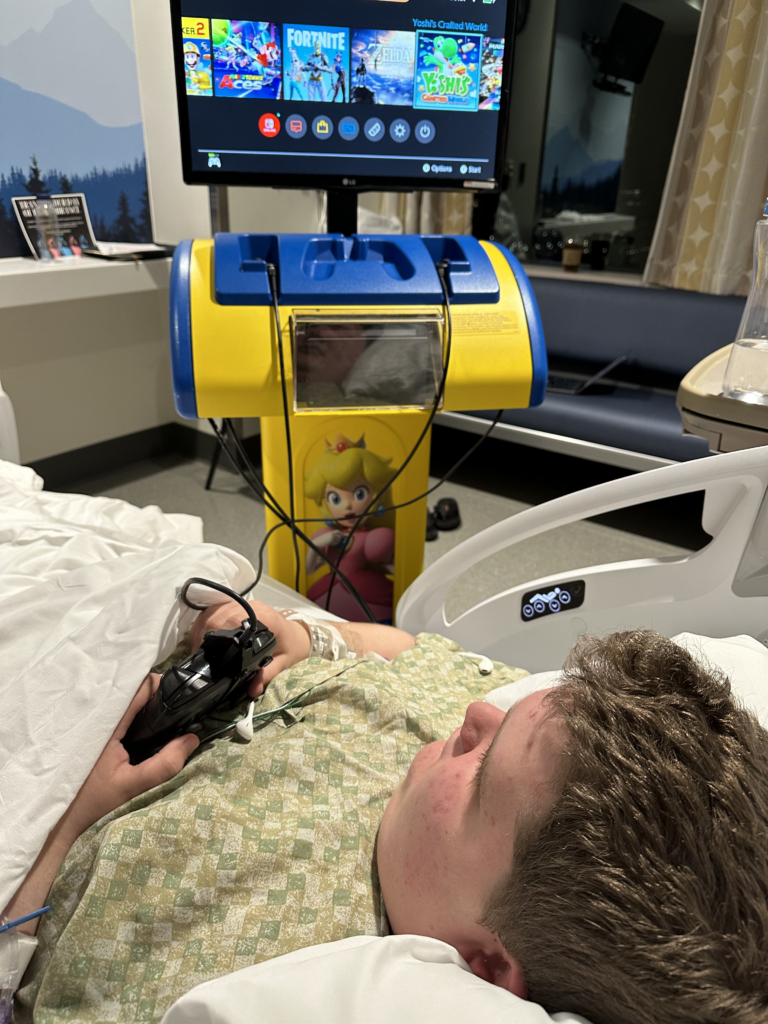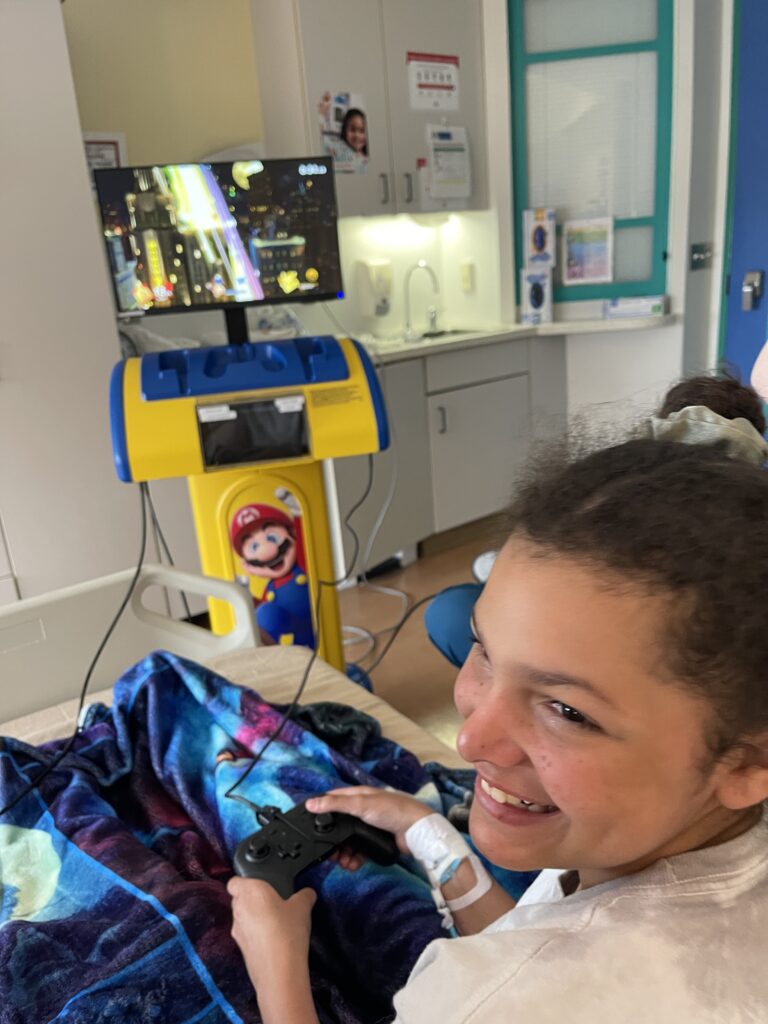The healing power of play: how starlight delivers happiness to kids living with rare diseases

Starlight Children’s Foundation highlights stories of brave kids during rare disease month



LOS ANGELES, February 11, 2025 – Jade wanted to give up. Diagnosed with the most rare and severe form of pulmonary hypertension, the 11-year-old, at that time, was confined in the intensive care unit. Jade was waiting for a double lung transplant, the only treatment option for her condition.
Four months of hospitalisation was difficult for Jade. She felt scared, lonely and anxious. When she felt like giving up, Jade’s child life specialist introduced her to play-centred programs from Starlight Children’s Foundation, a non-profit dedicated to delivering happiness to hospitalised children and their families.
“When kids are happier, it can lead to better health outcomes. Starlight Children’s Foundation supports kids living with illnesses and rare diseases – and their families – through programs that unlock the healing power of play. While play might look a little different in hospital settings, play improves the well-being of children by providing an emotional outlet and social connections and diverting attention from pain and discomfort,” said Peyton Gelley, Starlight families manager and certified child life specialist at Starlight Children’s Foundation.
Reflecting on the small moments that made a significant difference in her hospital stay, Jade’s mom, Jan, said
“Being able to play on Starlight’s Gaming Station was a highlight of Jade’s hospital admission. It helped distract her and gave her a chance to decompress, forget about her worries for a while and laugh. We’re so grateful for Starlight Children’s Foundation and giving my gamer girl the opportunity to do what she loves while being stuck in the hospital.”
For kids like Jade, living with a rare disease, they face unique challenges.
According to the National Organization for Rare Disorders, the definition of rare disease is a disease affecting less than 200,000 people in the U.S. With over 7,000 identified rare diseases, 12.5 to 15 million American children are living with a rare condition, approximately half of the affected population. This means that one in 10 Americans is affected by a rare disease, with nearly half of them being children. Among the identified rare diseases, many are chronic, degenerative, and life-threatening; 72 percent have a genetic origin, and 70 percent of these genetic conditions begin in childhood.
While each rare disease may affect only a small number of people, collectively, rare diseases are far from rare.
Living with a rare paediatric disease presents many psychosocial challenges for the child, parents, caregivers and siblings. Children with rare diseases often face a long and challenging diagnostic journey, with many undergoing years of medical tests, misdiagnoses, and consultations with multiple specialists before receiving an accurate diagnosis. Fewer than 5 percent of rare conditions have an FDA-approved therapy, leaving many families to rely on experimental treatments, clinical trials, or symptom management. Lastly, frequent hospitalizations and the need for critical in-home care place significant physical, emotional, and financial strain on children and their families as they navigate complex medical needs.
That’s why Starlight exists. Starlight addresses the psychosocial needs of seriously ill children by transforming the hospital stays into a positive and uplifting experience through vital programs offered free of charge to over 800 children’s hospitals and healthcare facilities nationwide, as well as to families enrolled in Starlight’s family program. These donor-funded programs, including Starlight Hospital Gowns, Starlight Gaming powered by Nintendo and Toy Deliveries, provide play and distraction therapy, social connection and family support, and foster a sense of normalcy in an unfamiliar setting.
Made with higher-quality fabric with more privacy and designed with familiar games and characters, kids prefer wearing Starlight Hospital Gowns over standard-issued gowns. According to Jan, Jade loved the Starlight gowns. She found them more comfortable and thought they were “cooler” than a regular hospital gown.
Like Jade, a New Bedford-area teenager, Patrick benefited from Starlight Gaming. With a long, complex medical history, Patrick was born with tethered spinal cord syndrome, a neurological disorder in which the spinal cord’s movement is limited, impacting bladder bowel motion and memory.
Two years ago, when he was 13, he underwent tethered cord surgery and was required to lay flat on his hospital bed for 48 hours. For Patrick, who also manages multiple conditions—including PTSD, ASD, ADHD, anxiety, and depression—hospitalisation exacerbated his feelings of distress. However, playing Mario Kart with the hospital staff while lying on his back provided Patrick with a way to cope with the emotional challenges of hospitalisation.
Gaming brought Patrick joy, excitement, and a renewed motivation to feel better.
“The Starlight gaming station has deeply lowered his stress, anxiety, or feelings of overwhelm, particularly in unfamiliar or emotionally charged situations like trying to walk again after his tether cord surgery,”
Kathryn, Patrick’s mom
Studies have shown that playing video games can improve cognitive performance and well-being in children. In a recent study published by the LA Times, Hiroyuki Egami, a Japanese economist and father, used video game lotteries during the COVID-19 lockdown as a natural experiment to study the impact of gaming on mental health. Egami found that playing video games improved psychological well-being, reinforcing the positive effects of gaming on mental health, including reducing feelings of loneliness, providing stress relief, and offering a sense of achievement and purpose.
Living with spinal muscular atrophy type 1, a rare genetic disease that causes progressive muscle weakness and respiratory difficulties, five-year-old Rhys from Los Angeles has a weakened respiratory system and was hospitalised in isolation twice for respiratory syncytial virus (RSV), a highly contagious viral infection.
According to her mom, Ceri, the boredom of isolation wore her down.
“She was so miserable and upset about being in the hospital and feeling crummy.”
Rhys’ hospital experience transformed when she received a Starlight Hospital Gown and a toy delivery from the hospital staff. Channeling the superpowers of her character-themed gown, she found new opportunities for social connection. Once fearful of doctors and nurses, Rhys engaged in imaginative play with them, turning routine interactions into make-believe adventures. With the support of Starlight programs, her hospital stay became a fun, comforting, and safe environment that helped her cope with treatment.
“At Starlight, we advocate for the well-being of pediatric patients no matter what illness they’re living with. During Rare Disease Month, it’s important to highlight the bravery of kids living with rare diseases and the impact of our work in delivering happiness to sick kids through play,”
Peyton Gelley
Now out of the hospital, the brave young girl from Fort Worth turned 14 in January and visits her doctor regularly. Living with an immuno-compromised condition, Jade is homeschooled and takes extra precautions whenever she goes out in public. She loves to play with her virtual reality headset, a toy delivery provided by Starlight to help support her in-home care, and her golden retriever Latte, a gift Jan gave her to uplift her spirits after the surgery.
“I am so humbled that donors and the foundation make these programs available to children who are facing sickness. It gives them a tiny sense of normalcy while they are not feeling normal,” said Jan.
Community members can help make a difference during Rare Disease Month by donating or learning more at starlight.org.
About Starlight Children’s Foundation
Hospital stays can be lonely, stressful, and scary. That’s why Starlight exists. Founded in 1982, Starlight Children’s Foundation is a 501(c)3 organization that aims to deliver happiness to seriously ill children and their families through vital programs that impact millions of kids annually. Donor-funded and offered free of charge to hospitals and families, Starlight programs unleash the power of play, empowering kids with a renewed sense of optimism, resilience, and courage. Starlight is a top-rated charity committed to the equitable allocation of programs to its nationwide hospital network. Happy kids heal faster.
Learn more at starlight.org and follow Starlight on social media @starlightchildrensfoundation.
Contact: Rick Jardiolin – Director of Public Relations & Communications, Starlight Children’s Foundation Email: rick.jardiolin@starlight.org / Tel: 415-794-9349

